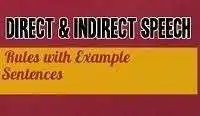
GENERAL RULES FOR CHANGING DIRECT SPEECH INTO INDIRECT SPEECH
(A)Change in Pronouns:
A sentence of Direct Speech has two parts. The part before the inverted commas is called Reporting Verb and the part within the inverted commas is called Reported Speech. When a direct sentence is changed into an indirect one, the pronouns of the Reported Speech change according to the reporting verb. The following rules should be kept in mind :
(i)The pronouns of the 1st person are changed according to the subject of the Reporting Verb.
(ii) The pronouns of the IInd person are changed according to the object of the Reporting Verb.
(iii) The pronouns of the IIIrd person of the Direct Speech are not changed at all.
The following diagram will make it clear:
S O N
I II III (No change)
| 1 | 2 | 3 |
| S | O | N |
Here: S = Subject I = First person
O = Object II = Second person
N = No change III= Third person
For different kinds of pronouns, please study the following chart carefully.
| Persons of Pronouns | Nominative Case | Possessive Case | Objective Case |
| First Person | |||
| Singular | I | my, mine | Me |
| Plurals | we | Our, Ours | us |
| Second Person | You, thou | You’re, thine | You, thee |
| Third Person | |||
| Singulars | He, She, it | His, her, its | Him, her, it |
| Plurals | They | their | them |
(b) Change of the adverbials of time and place or some other words:
| Direct | Indirect |
| This | That |
| These | Those |
| Here | There |
| Hence, hereby | thence, thereby |
| now | then |
| today | that day |
| tomorrow | the next day, the following day |
| yesterday | the previous day, the day before |
| tonight | that night |
| ago | before |
| thus | so |
(c) Change in Tenses :
(i) If the reporting verb is in the Present or Future tense, the tense of the Direct Speech does not change: He says, “I am going to Delhi.” He says that he is going to Delhi.
(ii) When the reporting verb is in the past tense, the tense of the direct speech changes as follows:
| Direct | Indirect |
| Present Simple | Simple Past |
| Present Continuous | Past Continuous |
| Present Perfect | Past Perfect |
| Present Perfect Continuous | Past Perfect Continuous |
| Simple Past | Past Perfect |
| Past Continuous | Past Perfect Continuous |
| Future | Conditional (would/should) |
| Future Continuous | Conditional continuous (would/should + be + verb + ing) |
| Future Perfect | Conditional Perfect (would/should + have + III form) |
| Future Perfect Continuous | Conditional Perfect Continuous |
| Can | Could |
| May | Might |
Exceptions:
(i)The Present simple, when stating a general truth, does not change.
The teacher said, “The sun rises in the east.” The teacher said that the sun rises in the east.
(ii) Imaginary conditions (If …. were clauses) do not change :
He said, “If my son were here, I would be very happy
He said that if his son were there, he would be very happy.
(d) Change of Must:
(i) When must indicates future necessity or compulsion, it changes into the conditional :
He said, “I must leave tomorrow.”
He said that he would have to leave the next day.
(ii) For immediate necessity, the must is changed into had to :
She said, “I must go home now.”
She said that she had to go home then.
(iii) When must indicates permanent rule, prohibition, etc., it does not change:
The Principal said, “Students mustn’t smoke in the class.”
The Principal said that the students mustn’t smoke in the class.
Different Types of Sentences in the Direct Speech.
There are the following four kinds of sentences in the Direct Speech:
(a) Statements.
(b) Questions (Interrogative Sentences)
(c) Imperative sentences.
(d) Exclamations.
